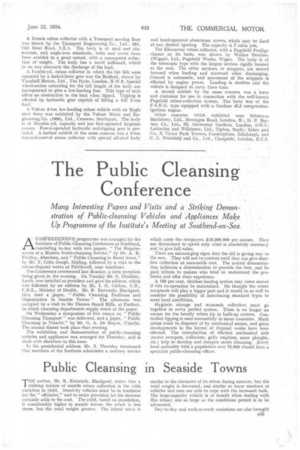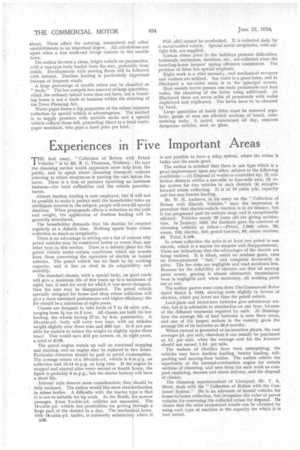Public Cleansing in Seaside Towns T HE author, Mr. R. Entwistle,
Page 49

Page 50

If you've noticed an error in this article please click here to report it so we can fix it.
Blackpool, states that a striking feature of seaside refuse collection is the wide variation in yield. Stand-by vehicles must be in readiness for the "offensive," and to make provision for the increase certainly adds to the cost. The yield, based on population, is considerably higher in seaside towns; the refuse is less dense, but the total weight greater. The inland town is
similar in the character of its refuse during summer, but the total weight is decreased, and similar or fewer numbers of vehicles and men are able to cope with the increased bulk. The large-capacity vehicle is of benefit when dealing with this refuse; one as large as the conditions permit is to be advocated.
Day-to-day and week-to-week variations are also brought )335 about. These affect the catering, amusement and other establishments to an important degree. All calculations are upset when a fine week-end brings visitors to the seaside town.
The author favours a clean, bright vehicle on pneumatics, with a van-type body loaded from the rear, preferably from inside. Developments with moving floors will be followed with interest. Dustless loading is particularly important because of frequent winds.
A large percentage of seaside refuse can be classified as " trade." The law compels free removal of large quantities, which the ordinary inland town does not have, but a hoarding house is not a trade or business within the meaning of the Town Planning Act.
Waste paper forms a big proportion of the refuse; separate collection by special vehicle is advantageous. The method is to supply premises with suitable sacks and a special vehicle collects those full, proceeding direct to a local wastepaper merchant, who pays a fixed price per load. Fish offal cannot be overlooked. It is collected daily by a metal-bodied vehicle. Special metal receptacles, with airtight lids, are supplied.
Certain refuse prior to the holidays presents difficulties; bedsteads, mattresses, furniture, etc., are collected when the boarding-house keepers' spring offensive commences. The problem of litter has special emphasis.
Night work is a vital necessity, and mechanical sweepers and washers are utilized. Sea water is a great boon, and in. Blackpool a sea-water main is in the principal streets. Most seaside towns possess one main promenade and foot walks, the cleansing of the latter being additional. At Blackpool there are seven miles of promenade with walks duplicated and triplicated. The latter have to be cleansed by hand.
Large quantities of beach litter must be removed regularly; gangs of men are allotted sections of beach, commencing early. A patrol, maintained all day, removes dangerous articles, such as glass.




























































































